SIGNIFICANT CONTRIBUTIONS
Early Career Highlights
In 2022, Greenberg published the largest study to date on theory of mind in the Proceedings of the National Academy of Sciences with 305,726 participants across 57 countries. The study validated sex differences in theory of mind using the popular ‘reading the mind in the eyes test’, which is listed as one of two recommended tests for measuring individual differences in ‘Understanding Mental States’ by the National Institute of Mental Health in the US. The study showed that females on-average score higher than males on theory of mind across ages and countries. The study was a collaboration with Cambridge University, Harvard University, and Bar-Ilan University.
In 2022, Greenberg published the largest cross-cultural study on music in the Journal of Personality and Social Psychology, with 356,649 participants across 53 countries. The study used both audio-based and genre-based methods to show that the patterns in correlations between personality traits and Western musical preferences are invariant (i.e. universal) across countries.
In 2021, Greenberg published the first article on the “social neuroscience of music” in the American Psychologist, and presented a brain model of the social brain during music-making. The article was co-authored by prominent neuroscientist Jean Decety at the University of Chicago.
In 2020, Greenberg formulated and tested a social psychological theory called the self-congruity effect of music, in the Journal of Personality and Social Psychology. The study showed that people prefer music of artists who have perceived personalities similar to themselves, and that musical preferences are driven by this personality-fit index, rather than pure musical preferences alone. The study included 86,570 participants and was co-authored by Sandra Matz at Columbia Business School.
In 2018, Greenberg published the largest study of autistic traits and autism, in the Proceedings of National Academy of Sciences, with 634,958 typical individuals and 36,648 autistic individuals,. The study confirmed prior theory that autistic individuals have greater D scores (drive to systemize) than typical people, and that D-scores account 18 times more variance in autistic traits than does sex. He study was co-authored by promininant neurodevelopmental psychologist, Simon Baron-Cohen.
In 2016, Greenberg published a new model for understanding the construction of perceived musical attributes called the arousal-valence-depth (AVD) model of musical attributes, in Social Psychological and Personality Science, . The study was published in collaboration with Jason Rentfrow at Cambridge University and prominent neuroscientist and best-selling author, Daniel Levitin. The AVD model was replicated in 2017, 2018, 2019, and has since been used in studies on musical preferences and analgesia.
Research Areas
MUSICAL PREFERENCES AND PERSONALITY
Within the field of personality and social psychology, Greenberg has applied interactionist theories to the topic of music, hypothesizing that people seek out musical environments that reflect their internal traits and meet their psychological needs. Greenberg’s work, which involves interdisciplinary collaborations with Cambridge, Stanford, Columbia, UPenn, and McGill Universities,.
Greenberg developed and established new methodologies for studying musical preferences that are genre-free and audio-based. From these methods he developed the arousal-valence-depth (AVD) model of musical attributes, showing that people perceive music along three broad dimensions that overlap with the commonly known arousal-valence theory of emotions. This model has been used along with the MUSIC model of meta-styles to show that personality traits are correlated with musical preferences.
Greenberg conducted an industry collaboration with Spotify to establish ecological validity for the correlations between musical preferences and personality traits. Their 2020 study showed that Spotify listening records can predict scores on the big five personality traits with moderate to high accuracy. The Spotify study contrasted an earlier self-report-based meta-analysis, which suggested that personality traits play only a small role in musical preferences; rather, the Spotify study showed with big data and advanced machine learning methods that personality is indeed important and warrants continued rigorous investigation.
Greenberg has also shown that musical preferences are linked to psychological traits beyond the Big Five personality traits, including empathizing-systemizing cognitive styles. Greenberg’s work has also extended beyond musical preferences, showing that personality traits, namely trait openness, is the strongest predictor of musical ability aside from prior musical training.
Greenberg showed that the correlations between musical preferences and personality are invariant (i.e. universal) across countries, demonstrating robust geographical validity for the correlations. The study was the largest study of music across cultures to date.
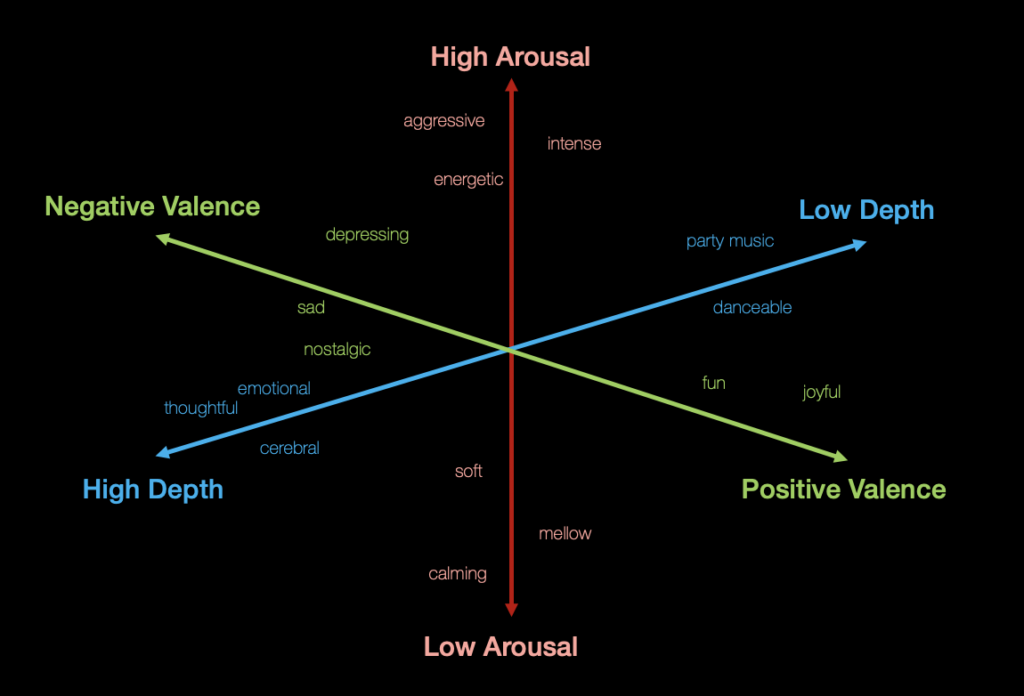
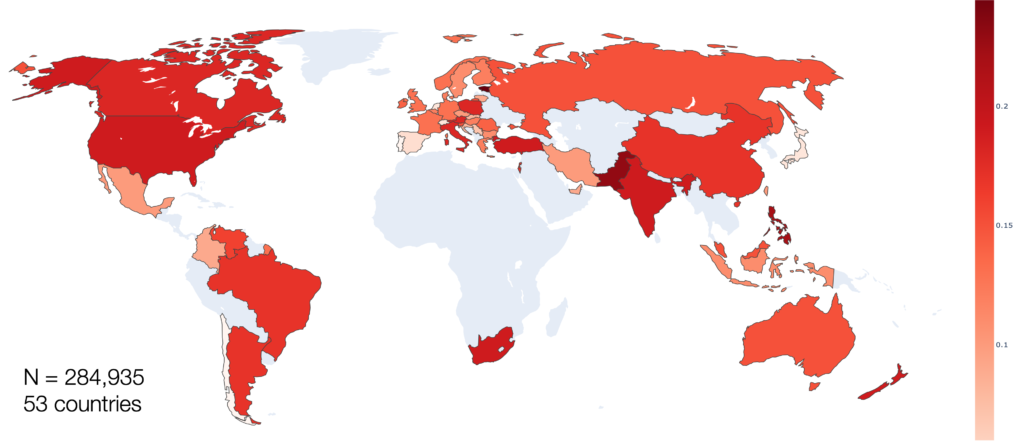
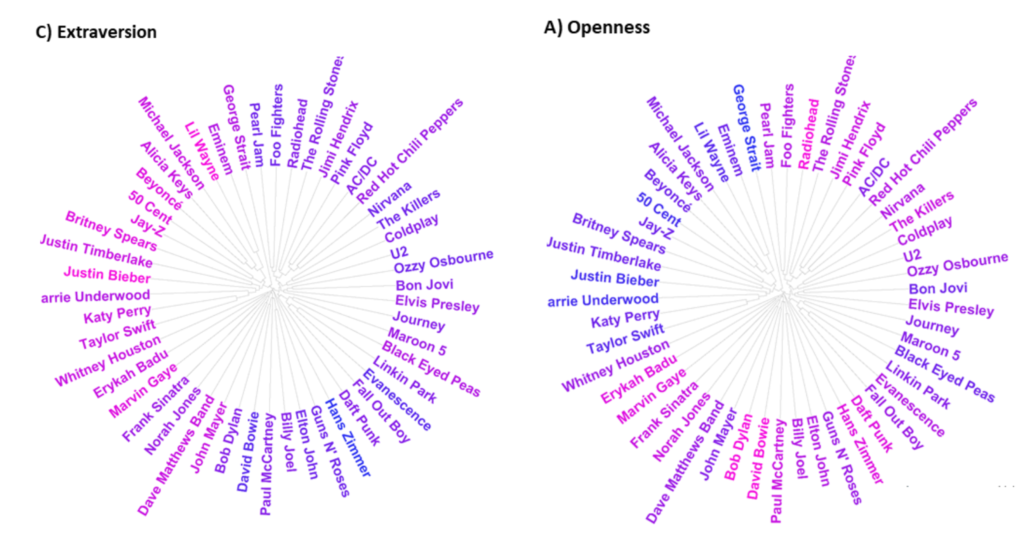
SOCIAL NEUROSCIENCE OF MUSIC
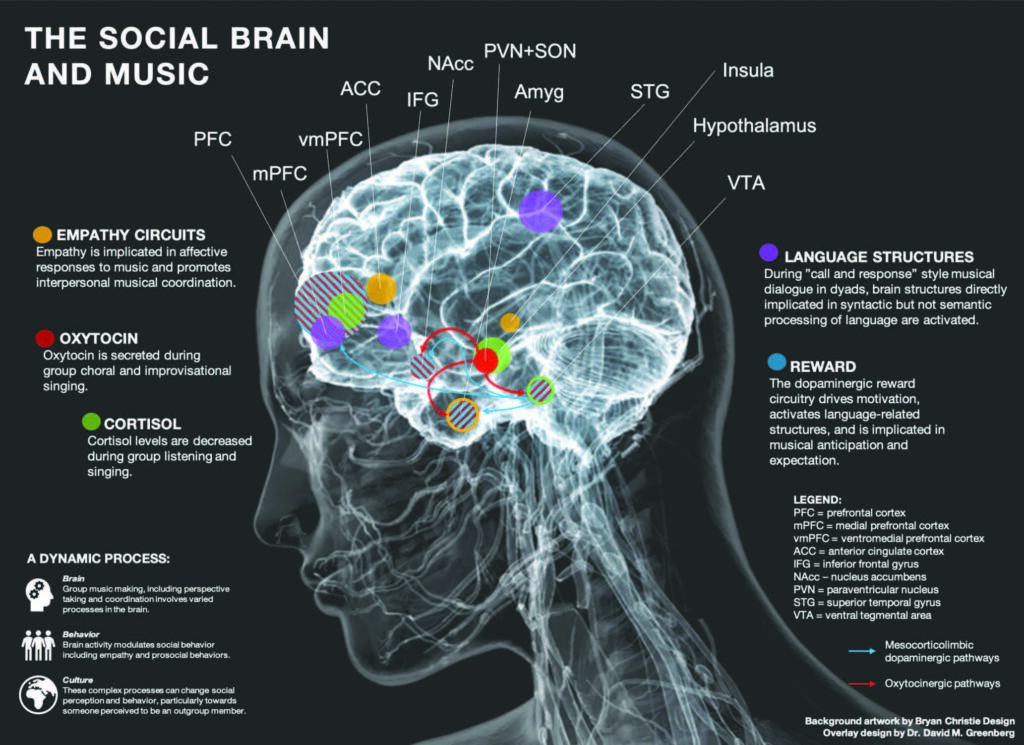
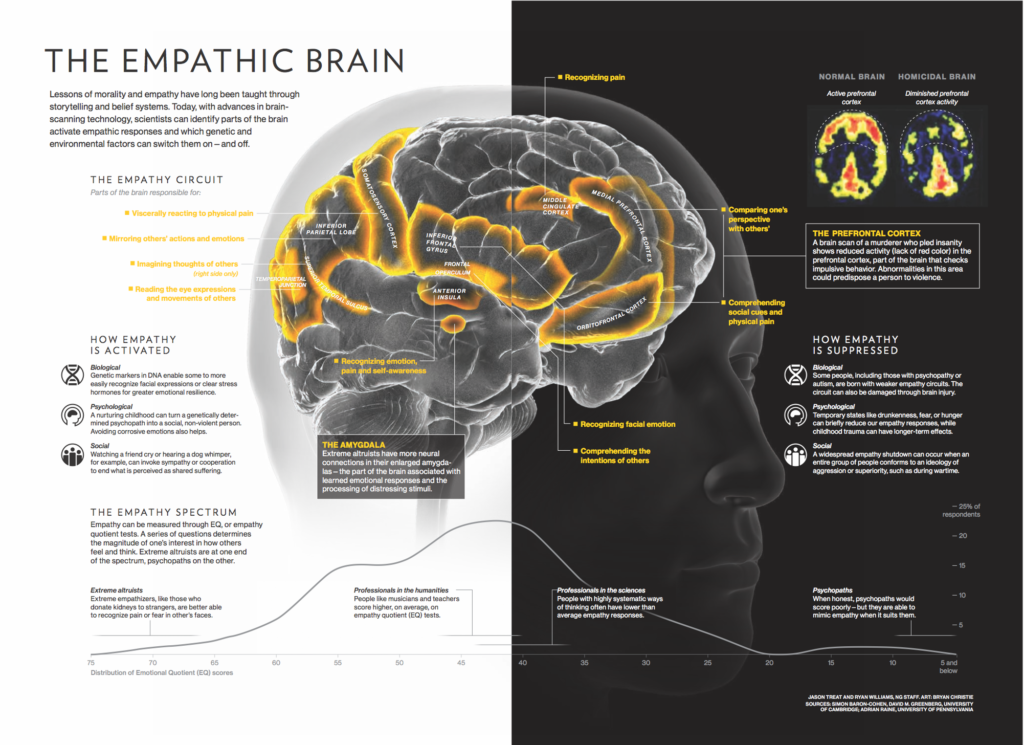
Greenberg has extended his work in personality and social psychology, to the field of social neuroscience. Greenberg and his colleagues identified the social brain networks implicated in music-making (in contrast to music listening) overlap with the networks implicated in the social processes of human cognition — mentalization, empathy, and synchrony — all components of the herding brain, which have evolved for social affiliation and connectedness (Greenberg, Decety, & Gordon, 2021, American Psychologist). In the model, they highlighted the role of oxytocin and the neurocircuitry associated with reward, stress, and the immune system. Greenberg and his colleague dubbed their approach the social neuroscience of music, which contrasts the prior decades of neuroscience research in the field which focused on the cognitive neuroscience of music.
Greenberg has worked with the Jerusalem Youth Chorus, which brings together Arab-Palestinians and Jewish-Israelis from East and West Jerusalem to rehearse and perform music from each other’s cultures and music from popular culture,,. To advance academic research on social conflict and translate these findings, Greenberg has led an initiative called One World in Song,, which is an international and interdisciplinary effort aimed at establishing a scientific basis for the use of music in social conflict and to translate the findings to community building around the world. Greenberg chaired its first international symposium in July 2021.
AUTISM RESEARCH AND MUSIC THERAPY
In the largest study to date on autistic traits (630,000 typical adults and 36,000 autistic adults), Greenberg tested 10 predictions from the Empathizing–Systemizing (E-S) theory. The results showed that, on average, autistic people have a greater drive to systemize (S) than empathize (E). In fact, E-S cognitive profiles (also referred to as D-scores) account for 19 times the variance in autistic traits (43%) than do other demographic variables, including sex, underscoring the importance of systemizing in autism. Greenberg and his colleagues extended these findings to cisgender individuals, transgender and gender-diverse individuals. In the largest study to date on theory of mind, Greenberg and his colleagues showed there is a female advantage on theory of mind tests across 57 countries. The research by Greenberg and colleagues laid a foundation in terms of basic theory and research for which research on clinical therapies can be built upon, including research into music.
Greenberg is currently leading as a Co-PI, the first nationwide randomized controlled trial (RCT) of improvisational music therapy with autistic children. The study is funded by the Autism Research Trust and Rosetrees Trust ($1.7 million). Greenberg and his colleagues launched a hyperscanning study funded by the Israeli Science Foundation that will investigate the impact of rhythmic synchrony on social communication in autism. Greenberg is on the editorial board of the Journal of Music Therapy.
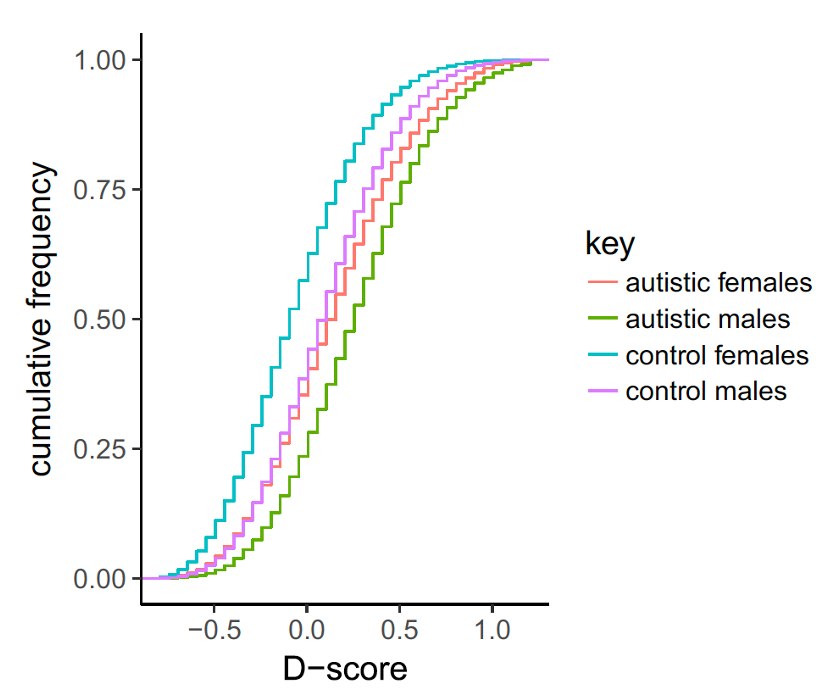

Tests and Materials
Greenberg and his colleagues have developed several psychometric tests. Please contact Dr. Greenberg for permission to use.
Engagement with Music Inventory (EMI)
Empathy Quotient-10 (EQ-10)
Systemizing Quotient-10 (SQ-10)
E-S ‘Brain Type’ Calculations
Sensory Perception Quotient-10 (SPQ-10)
Mentalized Affectivity Scale (MAS)
Brief Mentalized Affectivity Scale (BMAS)